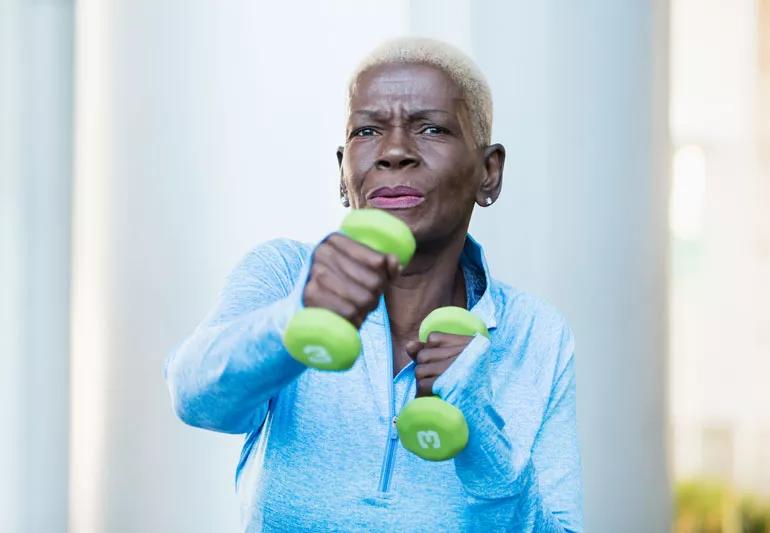And 4 things you can do to combat heat and cold intolerances

Image content: This image is available to view online.
View image online (https://assets.clevelandclinic.org/transform/c9636bbe-7e8d-4815-a456-50810c6904aa/elderlyTemperatureFlux-914997634-770x533-1_jpg)
elderly woman uses weights for resistance training
You know the stereotypes: the grandparents’ house that’s 85 degrees in July or the uncle who wears sandals in January. Turns out, these behaviors are rooted in science.
Advertisement
Cleveland Clinic is a non-profit academic medical center. Advertising on our site helps support our mission. We do not endorse non-Cleveland Clinic products or services. Policy
While some signs of aging are visible (cue gray hairs and wrinkles), others are stealthier, including feeling hotter or colder as you get older.
“As we age, our body distribution changes — including our body fat percentage, muscle mass, skin and sweat glands. These changes can affect our body’s thermal regulation,” says geriatric medicine specialist Ken Koncilja, MD. “As a result, we may not recognize temperature swings as well. Our core body temperature may even change.”
Temperature intolerances tend to happen in your 70s or 80s. If they happen earlier, certain medical conditions may be to blame, including:
Advertisement
“This is something that I often bring up with patients during annual wellness visits,” says Dr. Koncilja. “If something is off about your heat or cold tolerance, let your healthcare provider know.”
If your heat and cold intolerances are age-related, Dr. Koncilja recommends the following:
Stay hydrated: As we age, our thirst reflex diminishes, too. That’s why it’s important to drink plenty of liquids, no matter the weather.
Watch the weather: Pay attention to the heat index in the summer and wind chill factor in the winter. “When the heat index is above a certain number, local health departments will issue warnings for older adults and small children,” notes Dr. Koncilja. “It’s important to have access to shade. And know where to go in a heat wave if you don’t have air conditioning, such as a gym, school, church or another resource in your city or county.”
Build muscle: “You can build muscle at any age. Use resistance training as training for your everyday life. It makes a difference for body temperature regulation (thermoregulation).”
Dress for success: In warm weather, wear light, cotton clothing. In cold weather, choose warm materials like wool. Wear gloves and hats that cover your ears. “Frostbite is common in older adults, and it can happen quickly,” adds Dr. Koncilja. “Footwear matters. Get warm socks and good quality, warm boots or shoes.”
Advertisement

Delivered every Tuesday!
Sign up for our Health Essentials emails for expert guidance on nutrition, fitness, sleep, skin care and more
It's a letter about the news!

Every two weeks once
Sign up for our Health Essentials emails for expert guidance on nutrition, fitness, sleep, skin care and more.
Learn more about our editorial process.
Advertisement
There’s no one answer, as your temperature fluctuates throughout the day and your life
With repeat injections over time, you may be able to slow the development of new wrinkles
The cosmetic injection may help train your muscles out of frowning, but there’s no hard data to say for sure
Living longer is more than just growing older — it’s also about living life to its fullest
Turns out your health really is in your hands
This common problem has plenty of solutions, from supplements to slugging
When free radicals don’t have antioxidants to keep them in check, they go rogue
A look at bone buildup and loss throughout your life
Type 2 diabetes isn’t inevitable with these dietary changes
Applying a hot or cold compress can help with pain
Pump up your iron intake with foods like tuna, tofu and turkey